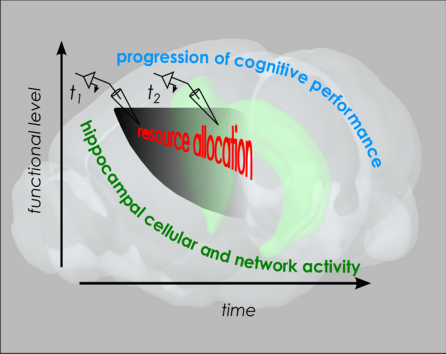A03 - Neural resource allocation by spatial memory circuits facing progressive pathological challenges
|
Functional changes of the spatiotemporal organisation of cellular and network activity likely precede the onset of symptoms in cognitive disorders, but to which extent a cognitive reserve can prevent the behavioural manifestation on the learning and memory level is unknown. In this project we will a) assess the neural resource allocation within the hippocampal circuitry during spatial learning and b) test interventional strategies based on ameliorating inhibitory circuit function as the circuitry is gradually challenged by unifactorial (beta-amyloid deposition) and multifactorial pathology (additional metabolic-vascular comorbidities) associated with a high-fat/high-glucose diet. We will investigate using in-depth analyses of hippocampal oscillatory cross-frequency coupling, multiphoton Ca2+ imaging and deep-learning-based behavioural quantification in mice how performance prediction within the neural feature space correlates with behavioural performance. Such an approach will allow us to understand important principles of resource allocation during the initiation and progression of cognitive impairment in response to progressing pathology. Moreover, our longitudinal approach will make it possible to identify in vivo biomarkers of cognitive resource availability on the electrophysiological, circuit and behavioural level. In the hippocampal formation inhibitory circuit function is a prerequisite for the structured organisation of neuronal activity during oscillations in the theta, gamma and high-frequency range. Our analyses and interventional strategies will therefore focus on a) detecting abnormal patterns of oscillatory activity and assessing the predictive power for cognitive dysfunction and b) restoring physiological oscillatory patterns with the aim of increasing cognitive resources. Such an approach may offer long-term perspectives for detection and therapeutic intervention in humans. |
|
 |
Conceptual framework of the project: By detecting functional changes on multiple levels at different time points of pathogenesis we will test the hypothesis that detectable functional changes on the level of temporal organisation of oscillations, cellular excitability, plasticity and behavioural dynamics precede the detectable onset of cognitive decline and thus can be used as functional biomarkers of resource availability. |






